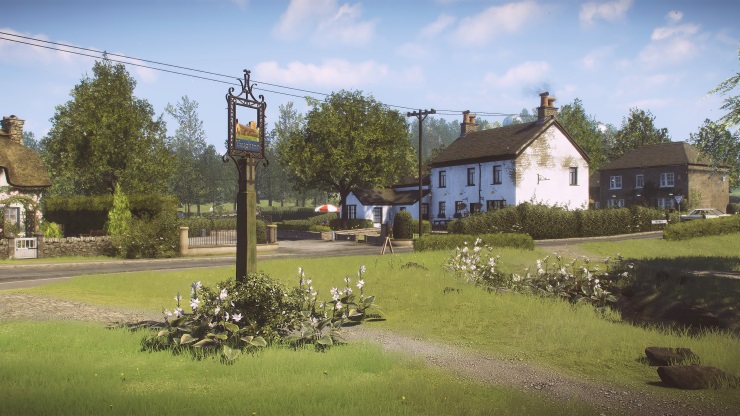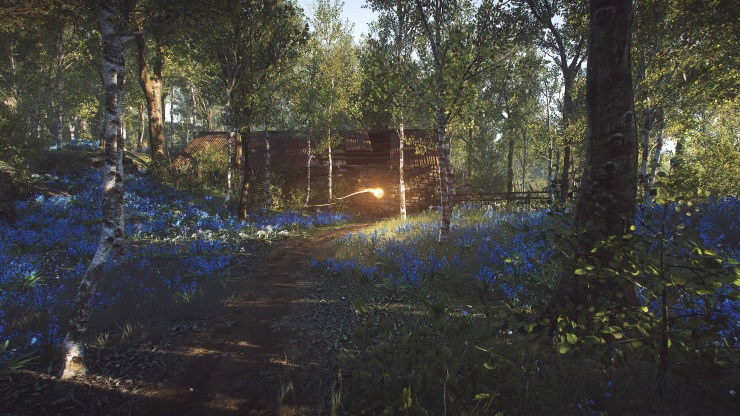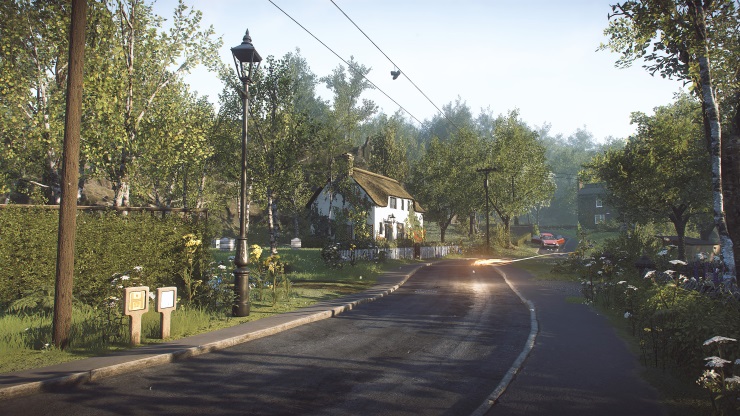Everybody’s Gone to the Rapture Review
Half an hour into Everybody’s Gone to the Rapture it dawned on me: nobody has ever made a game like this before. Nobody has ever put me into a world that feels so close to home. Games are littered with “real-world” locations, sure, but they’re always New York, Seattle, London, or Paris. Nobody has ever taken me, and popped me into rural England before, and let me explore somewhere that feels like it exists round the corner from my house. The trees, the thatched cottages, the greenery – the countryside.
The Chinese Room is utterly, completely successful in rooting its game in a world that seems real; that exists. There’s no caveat here. At one point I walked through the village green, with a gentle stream pushing underneath a stone bridge, as birds chirped around me. To my left, there was a small playground area for children to frolic, and to my right, an olde English pub. Not some trendy, popular bar you’d find in that there London. No, this is a pub where you’d know everyone’s name, the kind where your dad would have his name on a tankard, and where the decor is antiquated; the whole place needs decorating, quite frankly. And I stand there, looking through the stained windows at the interior, thinking how marvelous it is that they bothered to render it, and how nice it’d be to be able to go inside.

Five minutes later I’ve been inside and explored the pub, seen the sign that informs patrons that it’s £2 for a pint and a curry, looked at the scores on the dartboard, and walked out the back door into the beer garden, which is suitably well-kept, with its flowers flourishing in the English sun. It’s gorgeous, as is everything about this fictional village called Yaughton, in the very real county of Shropshire. Red phone boxes, water mains signs, and real postboxes (even down the collection plates) exist here, and the sun beams through the many trees, the shadows dancing and moving with every footstep taken. Buildings look the right size, and entering them reveals the small, tight landing areas of many British homes, before opening up onto a large garden. Yaughton may not be real, but it feels like one of the most real places I’ve ever visited in a game.
But something isn’t right, because there’s nobody to be found – the village is completely empty. As you walk around the (large, it has to be said) village, you discover remnants of what has come before you, filling in the many blanks that are initially offered up. Key characters are revealed slowly, and you discover more about them through these moments in time, as well as finding radios to listen to, and phones that tempt you off the beaten path to answer them, thus helping you to understand even more of what is going on. It feels like such a cop-out to say this, but it’s such an interesting, captivating tale, that I won’t go any deeper into here. But I will say that it’s one well worth seeing through to the credits, and has some heart-wrenching moments, too, with believable characters you’ll feel for.

Indeed, much of the emotional impact is through the audio. The dialogue is delivered perfectly. There’s not a single misstep here, be it from the Shropshire accents (it’ll be interesting to see how non-UK residents take to them, actually, with some of the slang used) to the Welsh ones. It’s interesting that such attention to detail is found in the voice acting as well as the visuals, but it’s great to see. What elevates the audio design so high, however, is the soundtrack. When the orchestral choir breaks into song it feels as though you are being propelled through the sky. It’s glorious, and one of the best modern soundtracks in quite some time.
Rapture will be one of those games that has the “is it a game?” people out in force, though. There’s very little interaction aside from answering the phones, turning on radios, and opening doors or gates here, and the walking pace itself is incredibly sedate. It’s really important that you understand this is a directed experience, this is a story for you to uncover, with locations to explore. The story beats happen regularly (and there’s far more of a story than there is in Dear Esther), but the onus is on the player to discover and unravel the tale. Mild motion controls are employed to open up certain pieces of the story, but that just boils down to turning the controller to the side slightly – it’s not in the least annoying. To compare to another game, it’s closest to a mix of Gone Home and Dear Esther, which is obviously no bad thing, only it’s on a far larger scale.

Using CryEngine3 means that Rapture looks out of this world. Upon closer inspection, some textures aren’t quite as good as others (some water looks great, some looks a bit odd), but given the scope and scale, it’s barely noticeable. As darkness turns to light, the shadows from the sped up time cycle are mesmerizing, and during the night sequences (especially) you should look to the sky for a truly special sight. When the orchestra swells and the visuals are at their best, Yaughton is spellbinding.
If there’s to be a complaint, it’s leveled at that movement speed. It’s nitpicking, but you move so slowly at times, and when the entire game is based around moving, it’s going to grind some people’s gears. But this is a special game, and one that is hard to pin down. A story that grips you firmly until the end, with some of the best visual and audio design in a long time, there’s so much here to recommend. As long as you know you’re getting a heavily scripted game, and are familiar with the type of experience, you’ll enjoy it. It won’t be for everyone, but for those that love Everybody’s Gone to the Rapture, it’ll stay in the memory for a very long time indeed.

